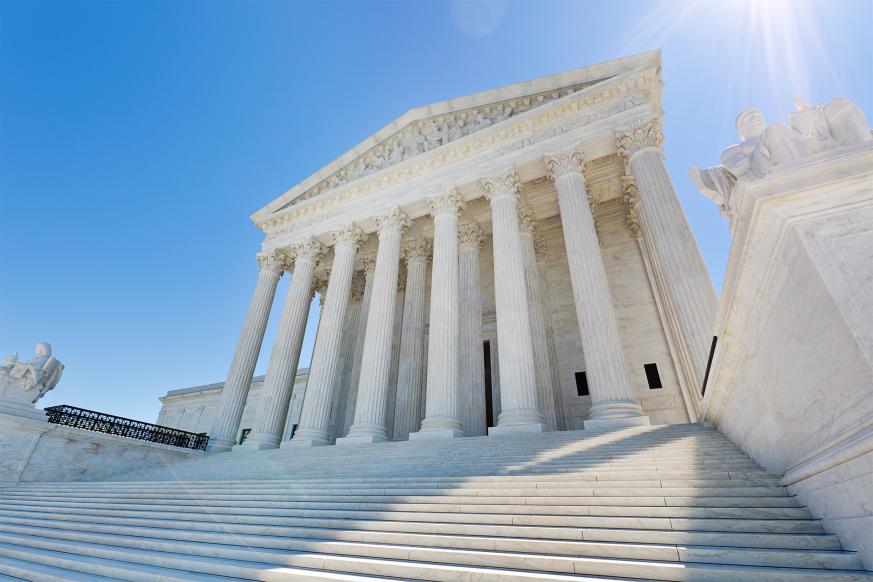Description: Two southern California parents claim two school board members violated their First Amendment rights by blocking the parents on social media after they posted critical comments about district policy and actions.

U.S. Supreme Court protects free speech online
High court protects the rights of citizens interacting with public officials on social media and the rights of officials engaged in private speech
Friday, Mar 15, 2024
WASHINGTON – The U.S. Supreme Court ruled Friday that public officials can be held accountable for free-speech violations on social media while simultaneously protecting those officials’ First Amendment rights when using social media for private purposes. The court issued decisions in Lindke v. Freed and O’Connor-Ratcliff v. Garnier, both of which dealt with government censorship on social media. Alliance Defending Freedom attorneys with co-counsel Brown Fox PLLC filed a friend-of-the-court brief in Garnier in August on behalf of the Manhattan Institute, a nonprofit public-policy research foundation with the mission to develop and disseminate new ideas that foster economic choice and individual responsibility.
ADF attorneys filed their brief in support of Christopher and Kimberly Garnier, two southern California parents who were censored and ultimately blocked by two school board members who used Facebook and Twitter to communicate government information to the public. The parents sued over the violation of their First Amendment rights. The brief proposed a fact-specific test that would examine the purpose and appearance of government officials’ posts to examine whether each post was public or personal.
“Social media is the modern public square, and government officials need to be held responsible when they act in their public capacity to suppress speech,” said ADF Senior Counsel and Vice President of Appellate Advocacy John Bursch. “Government officials cannot hide behind technology to pick and choose which viewpoints are allowed on issues of public concern. At the same time, government officials retain their own free speech rights to voice their personal views. The U.S. Supreme Court rightly recognized that government actors can be held responsible when the content and function of their social media interactions reflect government action, while protecting those officials’ freedom of speech when using social media for private purposes.”
In its decision in Freed, the court ruled that a social media post qualifies as state action when the official “(1) possessed actual authority to speak on the State’s behalf, and (2) purported to exercise that authority when he spoke on social media.” That ruling prevents state officials from avoiding First Amendment scrutiny by engaging in government censorship on their personal accounts. At the same time, its nuanced approach reflects the fact that “these officials too have the right to speak about public affairs in their personal capacities.” The court explained, “Lest any official lose that right, it is crucial for the plaintiff to show that the official is purporting to exercise state authority in specific posts.” As a result of that ruling, the court sent Garnier back to the U.S. Court of Appeals for the 9th Circuit to rule under the newly established test.
“This is a major win for the free and open exchange of ideas,” said ADF Senior Counsel and Vice President of Corporate Engagement Jeremy Tedesco. “Social media gives Americans the ability to access the public square anywhere, at any time, from the palm of their hand. The U.S. Supreme Court upheld the freedom of government officials to use social media for personal purposes and the responsibility of those same officials when acting in an official capacity.”
“I’m gratified that the Court unanimously adopted the kind of framework we advocated in our brief,” added Ilya Shapiro of the Manhattan Institute. “This is precisely the standard judges need for evaluating public officials’ use of social media.”
“Brown Fox is pleased with the Court’s unanimous decision and particularly its adoption of a framework that protects ordinary citizens against arbitrary government censorship while also protecting the rights of government workers to speak freely when they do so in their personal capacities,” said Cort Thomas of Brown Fox PLLC. “We are proud to have partnered with ADF and the Manhattan Institute in advocating for a standard that ultimately tracks closely with the framework the Court adopted.”
Alliance Defending Freedom is an alliance-building, non-profit legal organization committed to protecting religious freedom, free speech, parental rights, and the sanctity of life.
# # #